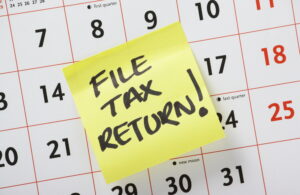Now is the time to file your taxes and make your estimated tax payment
 You have until Tuesday, April 18, to file your individual tax return and pay your first quarter estimated taxes. This year’s due date for the first quarter is Tuesday, April 18, 2023. In addition, you should be aware of the following.
You have until Tuesday, April 18, to file your individual tax return and pay your first quarter estimated taxes. This year’s due date for the first quarter is Tuesday, April 18, 2023. In addition, you should be aware of the following.
Paying your first quarter estimated taxes
At least 90% of your 2023 total or 100% of your 2022 federal tax bill must be withheld or paid in advance during the 2023 tax year. Suppose a quarterly payment is a requirement on top of the withholding from any paychecks. In that case, a fast glance at your 2022 tax return and a prediction of your 2023 tax obligation will help.
Additional considerations
- The penalty for underpayment. A penalty for underpayment may apply if you do not make the appropriate tax withholdings throughout the year. It is also insufficient to avoid an underpayment penalty by making an immediate payment at the end of the year.
- W-2 withholdings have special treatment. Anytime there is a W-2 withholding payment, that payment covers the entire year. However, you can change your W-2 wage withholdings to cover the shortfall if you don’t have enough money to make the expected quarterly payment.
- If you’re self-employed. Self-employed individuals must pay Social Security and Medicare taxes and income taxes. Therefore, you can avoid taking a cash flow hit each quarter to pay your projected taxes by opening and funding a savings account.
- Using your refund? Applying some or all of your 2022 tax refund is an alternative method of paying your 2023 first-quarter estimated tax.
- Pay more in the first quarter. You can position yourself to modify future projected tax payments later this year if your 2023 tax bill trends lower than you initially believed by paying more than necessary in the first quarter.
- Is a quarterly payment necessary? To find out how much tax you paid last year, quickly review your 2022 tax return. Compare this amount to your most recent paycheck by dividing it by the number of paychecks you receive annually. Then determine if that deduction amount from each paycheck is sufficient. If you need to change your withholdings to pay your 2023 tax bill, speak with your employer.
Avoid penalties
To avoid an underpayment penalty on your 2023 tax return, you must pay 110% of your 2022 tax liability if your income exceeds $150,000. If you’re married but filing separately, that number is $75,000. Contact our RRBB accountants and advisors if you have further questions.
RRBB eNEWSLETTER
Get free tax planning and financial advice




